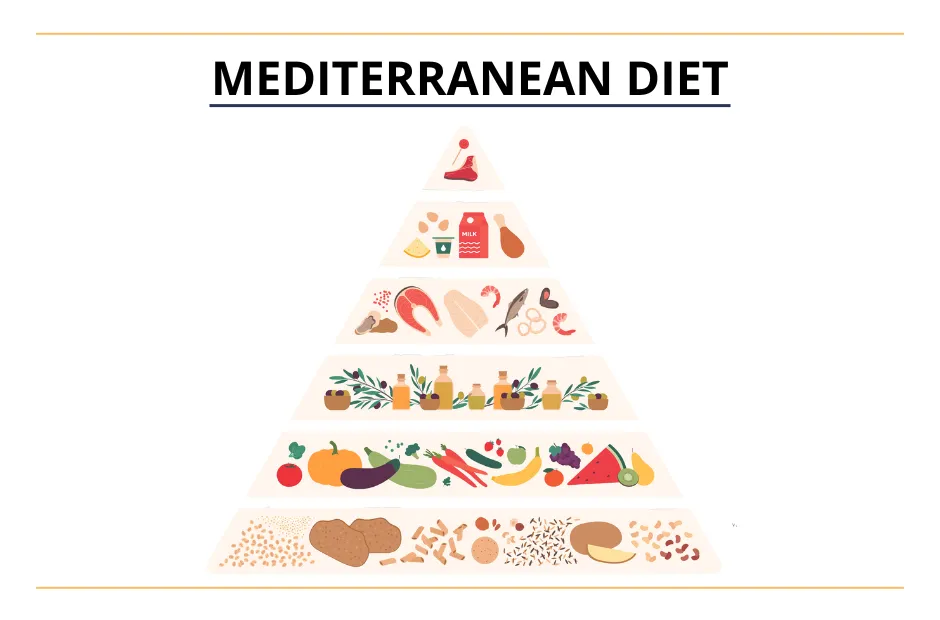Mediterranean Diet
The Mediterranean Diet (MED) emphasizes vegetables, fruits, olive oil, and wholesome fats, and has been shown to improve IBD symptoms and offer broad health benefits.


About the Mediterranean Diet
The Mediterranean Diet (MED) is characterized by a high intake of vegetables (2 servings per meal) and fruits (1-2 servings per meal), extra virgin olive oil (3 tablespoons per day), breads and cereals (1-2 servings per day), legumes (2 or more servings per week), seafood (more than 2 servings per week), eggs (2-4 servings per week), poultry (2 servings per week), limited dairy (1-2 servings per day), low intake of red meat (less than two servings per week), and limited sweets (less than two servings per week).1, 2
In addition to improving symptoms in IBD, data support its health benefits in other disease states such as cardiovascular disease, cancer, and diabetes, with much of its benefit attributed to reductions in inflammation from higher consumption of vegetables, fruits, nuts, and healthful fats from avocados, fish, and olive oil.3, 4 The Mediterranean diet may further serve as a preventive strategy against colon cancer5 and later-onset of Crohn's Disease.6
Implementing the Mediterranean Diet
Following the MED can be a challenge for some patients with IBD, especially if they have been following a low-fiber diet or they have strictures present. Some recommendations include to juice or puree fruits and well-cooked vegetables when beginning the diet. As symptoms improve or inflammation goes down, patients can start incorporating whole fruits and vegetables. Cereals in the diet refer to ancient grains (farro, wild rice, spelt, etc.). Rice is a good carbohydrate choice for this diet. Nuts and seeds for the MED can be consumed cooked and pureed (peanut butter and hummus), or even as homemade almond milk.
Summary of the Mediterranean Diet in IBD
Increasing research supports the role of the MED to improve the condition of IBD. For patients with IBD who prefer a choice that may be easier to follow, the MED is a good choice for improving the condition of IBD and overall health. One mechanism to explain the benefit may be via the anti-inflammatory properties afforded by favorably affecting the microbiome.7, 8, 9
The MED has been shown to significantly reduce symptoms in patients with either Crohn’s disease or ulcerative colitis .2, 10 A significantly larger portion of patients with either CD or UC following the MED experienced lower CRP and fecal calprotectin levels (<250 ug/g) as well as significantly improved quality of life scores.2 An important finding from the DINE CD trial10 was that patients with CD on either the SCD or MED had significant improvements in patient reported outcomes, including fatigue. Following pouch surgery for UC, patients with higher adherence to the MED were associated with decreased fecal calprotectin levels.11
The benefits of MED also extend to pediatric patients. In a prospective, randomized study of 100 patients (aged 12-18) with mild to moderate disease, half were given MED for 12 weeks.12 After this dietary change, the MED group "showed a significant decrease in both clinical scores (PCDAI and PUCAI) and most inflammatory markers (CRP, calprotectin, TNF-α, IL17., IL 12 and IL13) compared to patients in their normal group".12
References
- Bach-Faig A, Berry EM, Lairon D, et al. Mediterranean diet pyramid today. Science and cultural updates. Public Health Nutr. 2011;14(12A):2274-2284. doi:10.1017/S1368980011002515
- Chicco, F., Magrì, S., Cingolani, A., Paduano, D., Pesenti, M., Zara, F., Tumbarello, F., Urru, E., Melis, A., Casula, L., Fantini, M. C., & Usai, P. (2021). Multidimensional Impact of Mediterranean Diet on IBD Patients. Inflammatory Bowel Diseases, 27(1), 1–9. https://doi.org/10.1093/ibd/izaa097
- Martini D. Health Benefits of Mediterranean Diet. Nutrients. 2019;11(8):1802. Published 2019 Aug 5. doi:10.3390/nu11081802
- Tosti V, Bertozzi B, Fontana L. Health Benefits of the Mediterranean Diet: Metabolic and Molecular Mechanisms. J Gerontol A Biol Sci Med Sci. 2018;73(3):318-326. doi:10.1093/gerona/glx227
- Illescas O, Rodríguez-Sosa M, Gariboldi M. Mediterranean Diet to Prevent the Development of Colon Diseases: A Meta-Analysis of Gut Microbiota Studies. Nutrients. 2021;13(7):2234. Published 2021 Jun 29. doi:10.3390/nu13072234
- Khalili H, Håkansson N, Chan SS, et al. Adherence to a Mediterranean diet is associated with a lower risk of later-onset Crohn's disease: results from two large prospective cohort studies. Gut. 2020;69(9):1637-1644. doi:10.1136/gutjnl-2019-319505
- Reddavide R, Rotolo O, Caruso MG, et al. The role of diet in the prevention and treatment of Inflammatory Bowel Diseases. Acta Biomed. 2018;89(9-S):60-75. Published 2018 Dec 17. doi:10.23750/abm.v89i9-S.7952
- Tomasello G, Mazzola M, Leone A, et al. Nutrition, oxidative stress and intestinal dysbiosis: Influence of diet on gut microbiota in inflammatory bowel diseases. Biomed Pap Med Fac Univ Palacky Olomouc Czech Repub. 2016;160(4):461-466. doi:10.5507/bp.2016.052
- Ghosh TS, Rampelli S, Jeffery IB, et al. Mediterranean diet intervention alters the gut microbiome in older people reducing frailty and improving health status: the NU-AGE 1-year dietary intervention across five European countries. Gut. 2020;69(7):1218-1228. doi:10.1136/gutjnl-2019-319654
- Lewis JD, Sandler RS, Brotherton C, et al. A Randomized Trial Comparing the Specific Carbohydrate Diet to a Mediterranean Diet in Adults With Crohn's Disease [published correction appears in Gastroenterology. 2022 Nov;163(5):1473]. Gastroenterology. 2021;161(3):837-852.e9. doi:10.1053/j.gastro.2021.05.047
- Godny L, Reshef L, Pfeffer-Gik T, et al. Adherence to the Mediterranean diet is associated with decreased fecal calprotectin in patients with ulcerative colitis after pouch surgery. Eur J Nutr. 2020;59(7):3183-3190. doi:10.1007/s00394-019-02158-3
- El Amrousy D, Elashry H, Salamah A, Maher S, Abd-Elsalam SM, Hasan S. Adherence to the Mediterranean Diet Improved Clinical Scores and Inflammatory Markers in Children with Active Inflammatory Bowel Disease: A Randomized Trial. J Inflamm Res. 2022;15:2075-2086. Published 2022 Mar 29. doi:10.2147/JIR.S349502
MED Research articles
Delicious and Nutritious Recipes
Explore all recipesOur recipe section offers a wide range of options that align with various nutritional therapies, ensuring you can find meals and snacks that are both flavorful and supportive of your dietary needs.
Additional MED Resources




Support our Mission
Your donation will help us to enhance the well-being and health outcomes of patients with IBD.
Donate






